Want A Black Reality Dating Show On Network TV? 'Bachelor' Fans Have Ideas.
- Oops!Something went wrong.Please try again later.
- Oops!Something went wrong.Please try again later.
- Oops!Something went wrong.Please try again later.
- Oops!Something went wrong.Please try again later.
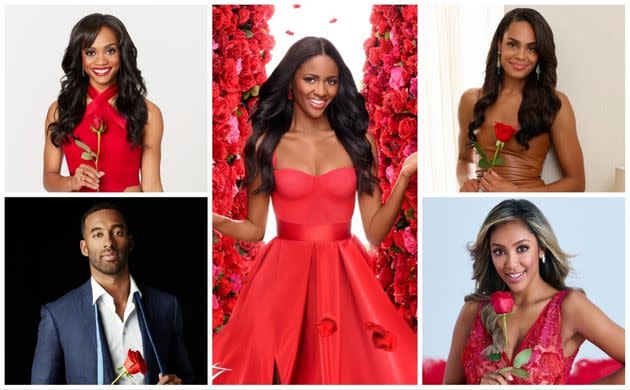
Since its inception two decades ago, "The Bachelor" franchise has only had 5 nonwhite leads thus far.
In an emotional highlight reel ahead of the new season of “The Bachelorette,” we see a young woman, with tears streaming down her face, on a journey to find love.
“I can’t wait to show little girls that look like me that being in a position like this is possible,” said Charity Lawson, the fifth Black lead in the “Bachelor” franchise. Since its inception two decades ago, the reality dating mainstay has been reluctant to reflect the demographics of a modern America — instead opting to overwhelmingly choose contestants who cater to the biggest portion of its audience: young, straight white people who tout their Christian values at every turn.
Season 20 of ABC’s “The Bachelorette,” which premiered in June, stars Lawson, a child and family therapist from Columbus, Georgia, and a runner-up on “The Bachelor” Season 27. The 27-year-old Auburn University alumna is the fourth Black woman to helm “The Bachelorette.” Her predecessors include Rachel Lindsay, the franchise’s first Black lead; she appeared on the series in 2017. Three biracial contestants have led the franchise: Season 16 Bachelorette Tayshia Adams (who is Black and Latina); the first Black Bachelor, Matt James; and James’ runner-up pick, Michelle Young, who starred in “The Bachelorette” Season 18. James and Young each have a Black father and a white mother.
For years, the shows’ fans and participants — known collectively as Bachelor Nation — have demanded that the franchise diversify its lead and contestants. Its loudest advocates have called for more racial, bodily and religious representation, among other things. The Bachelor Diversity Campaign, a fan-led collective championing these efforts, began in 2020.However, few substantive, long-lasting changes have actually been made by the “Bachelor” production team.
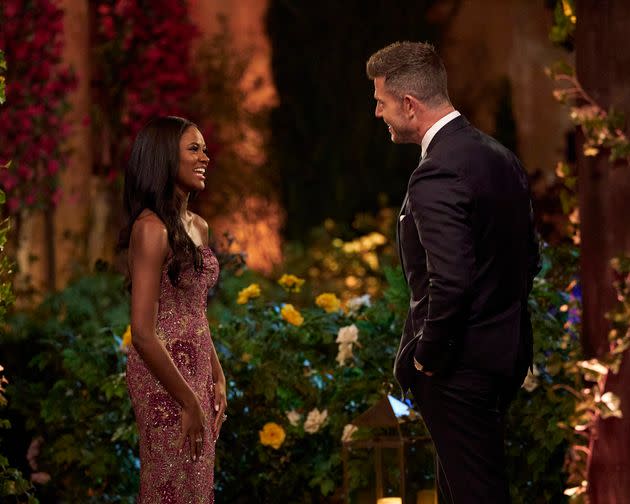
Season 20 of ABC’s “The Bachelorette,” stars Charity Lawson, a child and family therapist from Columbus, Georgia, and a runner-up on “The Bachelor” Season 27.
In 2021, amid an ostensible “racial reckoning” for the reality TV powerhouse (and across industries), several issues came to the forefront. Lindsay left the franchise after a contentious conversation with host Chris Harrison and years of advocating for better representation for people of color. James also called out the race problem with the “Bachelor” shows, which was an unprecedented move from a lead, as HuffPost reported at the time.
In 2021, Jodi Baskerville was named the franchise’s first Black executive producer, in a bid to remedy some of these issues. And after a two-decade stint as host, Harrison stepped down that year, a move that compounded the fallout of James’ season. In March 2023, the creator of “The Bachelor,” Mike Fleiss, left following an investigation regarding racial discrimination.
Though there may be more Black contestants than in earlier seasons, the “Bachelor″ franchise fails remarkably when it dips its toe into diverse waters, neglecting to support its Black leads and leaving them to educate others while also facing online vitriol. As a knee-jerk reaction to its shortcomings on diversity, the franchise reverts back to its default factory settings: a white lead front and center to appease its core base. See the Clayton Echard and Zach Shallcross seasons.
“The Bachelor” seems content in maintaining its lily-white veneer. While Black viewers have never needed “The Bachelor” for validation of Black love stories, repetition of the contestant archetype — a thin, white, cisheterosexual, evangelical model citizen — becomes disheartening to watch, fans told HuffPost. Ultimately, this leads Black audiences and fans to seek out other reality dating series that have approached diversity with care; it has made them wonder what “The Bachelor” — and other dating reality shows — could be doing differently. Rather than fighting for inclusion, is it possible to create a successful Black dating series on network television?
For Justine Kay, seeing Lindsay become a lead was the reason she started watching the franchise. Natasha Scott-Reichel had been following “The Bachelor” since its inception, but it was merely a guilty pleasure. After Lindsay’s season, the two created the popular podcast “2 Black Girls, 1 Rose,” which has garnered 33,000 Instagram followers and a punchy tagline: “Two Black-ass girls invade the whitest show on Earth.”
“We saw a very obvious gap in the ‘Bachelor’ podcast-sphere,” Scott-Reichel said. “Our intention was to connect with other viewers of color and Black women that watch the franchise. But along the way, we found a community of women, regardless of race, that were really interested in having more nuanced conversations about what we were watching on screen.”
The pair noted that their excitement over the first Black male lead on “The Bachelor” quickly faded, as it became the toughest season for them to watch.
“We didn’t realize how bad they were going to botch that season. We had to get really deep with it in a way that made recapping the show very arduous for us,” Scott-Reichel said. “At the crux of it, we just want to watch a TV show and have fun — we didn’t want our podcast to morph into a platform for educating white people.”
The co-hosts have since expanded their podcast conversations beyond the ABC franchise. Now, Kay and Scott-Reichel are embarking on general TV recaps and analyzing modern dating and relationship shows.
Scott-Reichel said a successful reality dating series not only needs to have and support Black contestants, but its casting process should select genuine, emotionally secure candidates. Referencing OWN’s “Ready To Love,” she said that the show’s focus on matching successful 30- and 40-year-old Black singles often brings in more mature contestants, but they also “have lived a full life and are showing up ready to bring their full selves and find a partner.”
Additionally, Scott-Reichel applauded “Ready To Love” for its authenticity in depicting Black people looking for romance, a byproduct of intentional casting efforts.
The series, which is hosted by comedian Tommy Miles and produced by Will Packer Media and Lighthearted Entertainment, debuts its eighth season on July 7. Audiences see couples date multiple people and ultimately choose the one who is “ready to love.” There have been a few long-term couples who continued their relationships after the cameras shut off. Clifton Pettie proposed to Joi Carter last September after a whirlwind romance on the series. Since then, the couple has been married and appeared on “Love and Marriage: DC,” another reality show on OWN.
Like other dating reality shows, “Ready to Love” can have its share of mess and drama. Mario Tolliver dated Reva Stout in a few episodes of Season 2, which was set in Houston, but he ended the season choosing Tondy Gallant as his biggest connection. On that reunion show, Tolliver revealed that he ended up reconnecting with Stout — and they’ve been together ever since.
Earlier this year, Rashid Floyd proposed to Symone Redwine on the seventh season premiere of “Ready to Love”; they appeared on Season 3 of the series. Just a few months later, they called off the engagement.
But Black-led franchises such as “Ready To Love” and TV One’s new show “The One” should not be the only offerings to represent Black love in reality television. Another issue is that these shows garner limited visibility since they air on cable networks and satellite TV, or are included as add-ons to bundled subscriptions with Hulu, YouTube TV, Fubo and other services.
“‘Ready To Love’ is not on Netflix, so it’s not like a global phenomenon. It’s on a pretty small network,” Scott-Reichel said. “But I think that’s a show that has done really well at presenting successful Black love stories, and I think it’s because of how well they cast the show.”
Kay says that in addition to ensuring appropriate casting, an all-Black dating show would have to be culturally relevant to the community. Kay and Scott-Reichel already have ideas for such a series: the contestants would all be members of historically Black Greek fraternities and sororities who are looking for love.
Kay said the key to success is taking a concept, practice or tradition that lies within one’s culture and building off that foundation. Netflix’s “Indian Matchmaking” and “Jewish Matchmaking,” for example, successfully found ways to showcase common practices in dating within their respective communities.
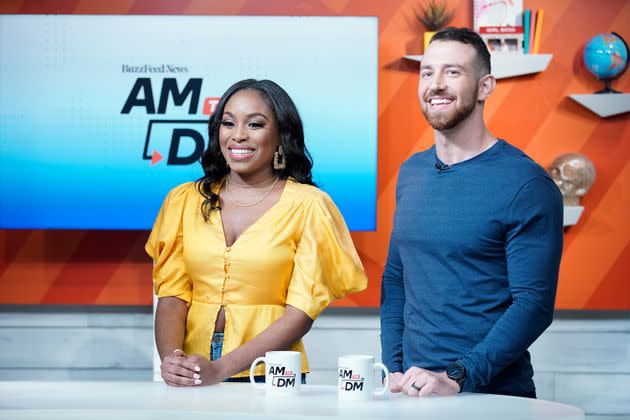
“Love Is Blind” alum Lauren Speed (left), wife to Cameron Hamilton (right), criticized the Netflix series for appearing to deliberately cut out Black women.
Creating a new Black dating series for network TV could be a game changer for larger audiences. But sometimes, networks don’t give their new Black-led shows time to gain viewership.
In March 2022, NBC launched a reality dating series called “The Courtship.” Filmed in England and capitalizing on the “Bridgerton” craze, the Regency-themed social experiment brought 20 suitors together to vie for the heart of Nicole Rémy, a Black woman who was selected in a nationwide casting call.
But just 10 days after its premiere, the show was pulled and sent to USA Network. At the time, IndieWire wrote that the show “struggled to attract an audience,” and when the second episode of “The Courtship” aired, it was “broadcast TV’s single lowest-rated (and least-watched) show of the night.”
Not only do networks and streamers fail to allow dating series with nonwhite leads to gain traction, but they often bait viewers with the illusion of diversity. “Love Is Blind” alum Lauren Speed-Hamilton called the franchise out during Season 3, tweeting that it appeared to deliberately cut out Black women.
Speed-Hamilton tweeted that “they only show what they deem most entertaining,” making it seem like producers don’t see Black love as aspirational or worth watching. Kay said that this falls in line with “the myth of marketability,” as producers succumb to the idea that Black love is not worth being televised. Chris Coelen, the creator of “Love Is Blind,” has defended the series’ practices in an interview with The Hollywood Reporter.
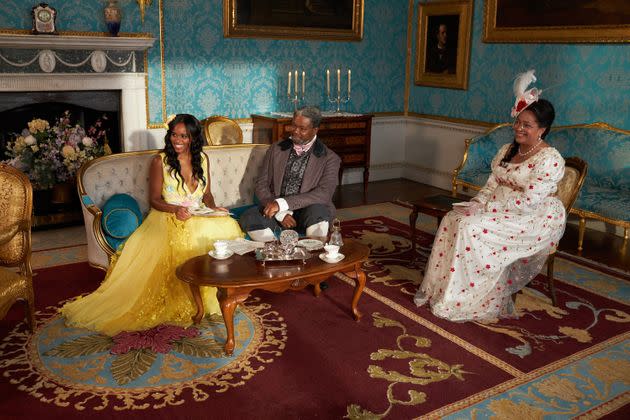
Starring Nicole Remy, “The Courtship" was a regency-themed social experiment, bringing 20 suitors together to vie for her heart. It lasted just one season at NBC.
“With these executives, they want to promote couples that have an aspirational quality to them. There’s like a blockage in them thinking of a Black couple as aspirational,” Kay said. “With an interracial couple, somehow, they see it, because there’s at least one person who’s white.”
“To them, it placates some level of ‘diversity fetish’ or whatever,” she continued.
Journalists Brandon Pope and Brandon Smith, who host the “Two Bros and a Rose” podcast, told HuffPost that it’s not enough for the “Bachelor” franchise to cast Black people, but that it must also expand beyond light-skinned or biracial Black women. (During James’ season of “The Bachelor,” the three finalists were two biracial contestants and one white woman named Rachael Kirkconnell, who eventually won.)
On social media, Pope and Smith have described “Two Bros and a Rose” as “the ONLY Bachelor(ette) Podcast hosted by Two Black Guys … [and] a woman to keep us honest,” Typically, fellow journalist Jonquilyn Hill joins their discussions.
“When the cast comes out for the show, especially in ‘The Bachelor’ where it’s the women competing, we do this thing on our podcast where we broach the colorism topic,” Smith said. “Each time, we do the ‘brown paper bag test,’ right? We’re like, ‘Look, how many of these women are really light-skinned or racially ambiguous?’ I don’t think there’s any incentive for them to change. They’re a lily-white legacy franchise.”
However, Pope argued that there is, in fact, a reason for the franchise to diversify its cast. In recent years, ratings and viewership for each season have dropped, he said.
“One of my fears with Charity’s season is that it’s not going to have good ratings. And it’s not going to be because they chose a Black lead; it’s going to be because the show has lost relevance over time,” said Pope, pushing back on the idea that Black leads are not marketable.
Viewership for Season 26 of “The Bachelor,” starring Echard, “hit a series low, topping out at 4.7 million for its grand finale,” Variety wrote in April 2022. Harrison, the former “Bachelor” host, said earlier this year that ratings have dropped 50% to 60% since the series’ inception.
Pope said that adding diversity will not only help the show reassert its relevance, but will “freshen it up and make it modern enough” for a broader American audience.
“There’s so much data out there showing that Black people are a force in media when it comes to viewing content, and appealing to them can only help you,” Pope said. “[Disney] is a company that just released ‘The Little Mermaid’ with Halle Bailey, had the ‘Black Panther’ phenomenon, and they’ve got cartoons like ‘Doc McStuffins.’ Yet when it comes to the ‘Bachelor’ franchise, they lose all ability and all diversity, equity and inclusion common sense here.” (Disney is the parent company of ABC, where the “Bachelor” franchise airs. It is produced by Warner Bros.)
Smith said the intention behind casting James was “obvious,” as his close friend Tyler Cameron was a previous contestant. But Smith also recalled that during the premiere, audiences were introduced to his white mother, who presented a nonthreatening air of respectability to the franchise’s “faith, football and family audience.”
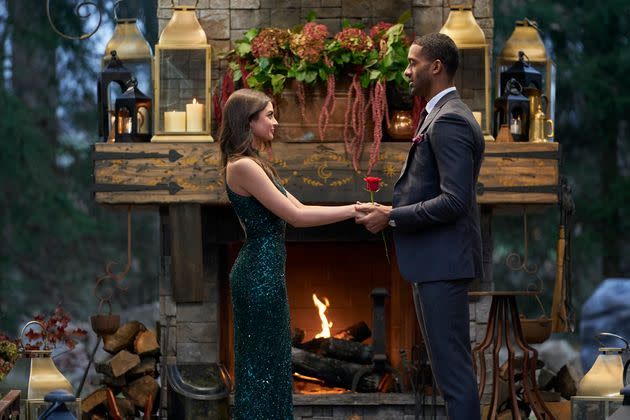
Rachael Kirkconnell (left) and Matt James (right), the first Black Bachelor, are seen together at the final rose ceremony, amid a season filled with racial turmoil.
And the season signaled to Black women that perhaps it’s futile to seek love from a Black man on reality TV. On James’ premiere episode, he talked about the outside pressures to choose a Black woman — and made it clear that he might not pick one.
Ultimately, he ended up with Kirkconnell (who has come under fire for attending an antebellum plantation-themed party and her questionable social media activity). His choice of the white finalist was unsurprising to many Black women watching “The Bachelor,” not only because data indicatesthat more Black men marry outside of their race than Black women do, but also because the series leans into white supremacist notions of femininity and desirability.
Pope said that the structure of the franchise is stale, too — and the concept of a Black version of “The Bachelor” is not “interesting enough.” If another Black reality dating series emerges, Pope and Smith would like to see it model an experimental format akin to “The Ultimatum,” “Love Is Blind” or “Married at First Sight.”
Caribbean Americans Alecka “Lex” Edwards and Jhenelle “Jhen” Monique are co-hosts of the “Blachelorettes” podcast, which they started after Season 16 of “The Bachelorette” starring Clare Crawley and later Adams. Edwards said she wants to see a Black reality dating series that merges matchmaking with the living conditions of “Big Brother,” but that ultimately allows Black contestants to simply be their full selves.
“What if there was like a group of people in a house — kind of like ‘Love Island’ — but they go on dates and they pair up?” Edwards said. “But then there’s a matchmaker behind the scenes, who is possibly a Black woman. I feel like that’s what makes ‘Love Island’ a cut above the rest. I don’t know if it’s like the casting process or what, but you can tell they’re very intentional about making sure that they’re finding the right people.”
The “Love Island” franchise started with a British reality series and became a hit across the pond, leading to an American spinoff. The U.S. version airs on CBS, while British “Love Island” episodes stream on Hulu five days after airing on ITV. (Only Seasons 1 and 2 of the British “Love Island” are available on Netflix.)
The show revolves around 11 initial contestants, referred to as “islanders,” vying for love and a cash prize. They have to “couple up” to survive and advance; occasionally, a “bombshell” enters the villa, catching various contestants’ eyes and spicing up the competition.
In just 10 seasons, the British “Love Island” has already seen its first nonwhite couple win. The same cannot be said of the “Bachelor” franchise, which poorly tried to replicate some tactics from its competitor.
“Even if it is about the drama and the entertainment, there’s a sense of camaraderie on the show that you don’t really see in American dating shows,” Edwards said. “During the [COVID-19] pandemic, I binged ‘Love Island.’ You got to really see a glimpse of the friendships that came out of it. Even if people did have tense moments, they hugged it out and went back to being friends. It kind of blew my mind. In American reality TV, we think there always needs to be drama, fighting and tension.”
As a Black pansexual polyamorous woman, Monique’s greatest concern about a Black dating series is that reality TV contestants and ideals tend to skew conservative.
“It always ends up being that you have to be a Christian, and being gay is ‘terrible,’” Monique said. “Black people can be from other religions as well, aside from Christianity. I will say that if you are casting a show with Black people, especially with Black queer people, you want to be vetting [contestants].”
Regarding Lawson’s season of “The Bachelorette,” Edwards and Monique’s hopes are low.
“I’m expecting the same old shit, just with a Black face,” Monique said.
What she — and many other Black audiences — want to see in the reality dating landscape is softness between two Black contestants and displayed toward Black women. Too often, Black women are tasked with carrying the mantle of progress, holding series accountable and advocating to improve the experiences of marginalized contestants and viewers.
Lawson has already pointed the “Bachelor” franchise in the right direction, requesting that the hair and makeup team be well-versed in working with Black talent. She also talked about holding “important conversations regarding race” with contestants and producers, and discussed the complexities facing her as the lead.
“Being [a] woman of color, but the second monoracial Black woman, to be in this role was huge. They are making strides slowly but surely,” she recently told Variety. “Whether that’s me bringing up key things that I wanted to openly discuss in conversations with the men, like important conversations about race, that’s something that I really pitched out a lot to the producers.”
However, the question remains as to whether the “Bachelor” franchise is interested in disrupting the way it deals with diverse contestants, issues of race, and showing Black love on screen. Perhaps Lawson will be the next step toward substantive change.
